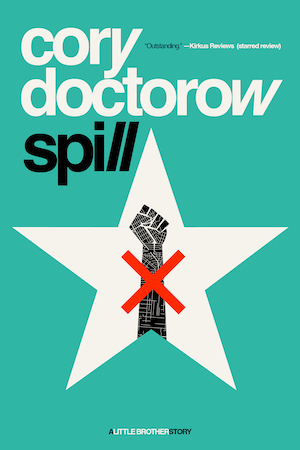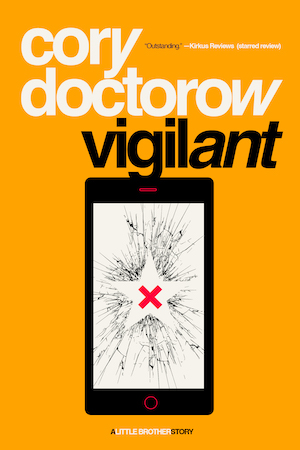While I was not amongst the champions of the first Joker film, its sequel had the power to turn my disappointment around. It promised so many things that I’m generally a fan of: Gaga! A musical! Sickos in love, maybe! The possibilities seemed bright (to me) despite being burned before. The fact that writer-director Todd Phillips never intended to make a sequel and only ran with the project due to his leading man’s desire to stay in that horrible world they co-created should, perhaps, have given me pause.
It’s hard to talk about this film without skewing into hyperbole about how patently awful it is. The hyperbole is deserved in this case, but we (correctly) don’t tend to trust it. I will, therefore, endeavor to explain what—precisely—went wrong with this exercise.
And for that, I do apologize.
The rundown is dour: Arthur Fleck (Joaquin Phoenix) is living a torturous existence in Arkham’s maximum security ward, while his lawyer Maryanne (Catherine Keener) is working to get him to trial for the murders he committed in the first film. Her hope is to convince the jury that Arthur has Dissociative Identity Disorder, and that “Joker” is a persona Arthur created to protect himself from abuse; if they win their case, he will hopefully be sent to a hospital where he’ll receive better care. This becomes complicated when Arthur meets “Lee” Quinzel at an art therapy class he’s been given special dispensation to attend at the “low security” ward at Arkham. Lee is infatuated with Joker, and encourages Arthur to lean into this persona right as he goes to trial. Their romance reaches increasingly toxic heights as Maryanne tries to warn Arthur away from taking Lee’s advice. Oh, and the duo sing a lot while all this is happening.
Let’s start with what’s certainly not the film’s worst faux pas, but perhaps its most irritating: Folie à Deux does not seem know what musicals are or how they work, despite attempting to be one. (It’s baffling in the extreme to note that Star Trek has a better grasp on musicals as an artform and how to employ them for maximum impact and enjoyment? Strange New Worlds’ recent musical episode showed better understanding of the craft than anything this film approaches.) There are rules to how these behemoths are built. And sure, rules are made to be broken, but broken with purpose. You can’t just have the characters erupt into rote standards every fifteen-ish minutes or so and go, We did it, we made a musical.
It would have been absolutely grand if the film had deigned to create its own soundtrack rather than lifting very boring choices from the annals of mid-century musical theater (tunes from Pal Joey, Sweet Charity, Summer Stock, The Roar of the Greasepaint — The Smell of the Crowd, and The Band Wagon, etc…) and stock ballad songbooks (think numbers popularized by Frank Sinatra, Stevie Wonder, and Burt Bacharach). And this speaks to one of the primary problems of the first Joker film: A blatant over-reliance on previous and better works to build something that thinks it’s new, or at least a worthy successor.
It would have been lovely, too, if the film had made a discernible choice on where fantasy and reality meet over the musical numbers. There are a few moments where it’s obvious—the film has no less than four (four!) dream sequences—but more often than not, you’re left wondering why other characters aren’t either reacting to or ignoring the incessant interludes. While the songs themselves are solid-if-unimaginable picks, the execution is utterly dull: If you manage to use the number “That’s Entertainment!” at several points in your movie, and its appearance is never once entertaining, it’s safe to say you’ve failed.
The first Joker film clearly believed it was commenting on societal ambivalence toward the mentally ill, impoverished, and abused, while ignoring the majority of people who shared Arthur’s plight; Folie à Deux loads up on brutality to similar ends. A more thoughtful film might have used this opportunity to critique the very real brutality inherent in our own prison system, but the violence is regularly used only to showcase how terrible things are for Arthur to the neglect of the men around him. Even the murder of a fellow inmate is a moment engineered to press Arthur into making a different choice at a key moment in the story.
Which leads us to dear Harleen, and perhaps the worst decision that Folie à Deux makes. The film poses a simple question: What if this time around, Harley was the abuser in the relationship?
Fans who know the origin of Harley’s character (on Batman: The Animated Series in the ‘90s), are aware that the story of Joker and Harley is certainly one of abuse: Harleen was a respected psychiatrist at Arkham assigned to work with Joker, only to be masterfully manipulated by the Clown Prince of Crime into becoming his girlfriend, accomplice, and crony. The show eventually reveals that Joker doesn’t truly care for Harley at all; he’s happy to let her perish if it means that he survives. The only time he changes his tune is when she turns around and tries to kill him in revenge… because abuse begets abuse, of course. The importance of Harley’s psychiatry background—and how Joker convinced her to abandon it—in the original story is key here, the depiction of a man who deliberately “dumbs down” a partner who is smarter than himself in order to make her more malleable to his will.
But the Joker movies cannot bear to have Arthur Fleck be anything but the One True Victim of Society and Circumstance. He is instantly smitten with Lee, who tells him that she grew up in his neighborhood, that she had a similar upbringing with a now-thankfully-dead father, that she is locked up because she set fire to her parents’ house. There are pieces of her story that don’t line up, but she’s clearly unwell, so the audience isn’t inclined to think much of the discrepancies, until Arthur’s lawyer tells him that Lee is playing him. She checked herself into the hospital in hopes of meeting him. Her parents are alive and she lives with them on the Upper West Side. And of course, she has a “graduate degree” in psychology. She’s doing all this to manipulate him toward her own ends.
So they turned Harley’s professional background into a conservative dog whistle against young folks who go to college. There isn’t really a clearer indication of the film’s artistic bankruptcy than that, so I’ll just leave that there.
And this is without getting into all the other normal movie problems that Folie à Deux has tenfold. The film is seemingly endless and tedious to boot; the pacing is all over the place; the Sonny and Cher rip-off sequence is inane and stilted when it should be a blast; oh, and by the way, there are as many endings to this movie as The Return of the King. And as the endings revved up, a good portion of my theater started laughing—everyone was fed up well before the shark jumped.
And jump it does—the ending of Joker: Folie à Deux is so ridiculous, it genuinely sounds fake to explain it out loud. It’s still difficult to laugh at it because the film is pure misery porn, but any attempt the movie made toward a more profound experience is well and truly lost by the ending’s ending’s ending. The rest of the journey isn’t off-the-rails enough to make it a good hate-watch either.
Perhaps filmmakers will stop listening to Joaquin Phoenix’s whims after this one, and for that we should all be grateful. As for everyone else involved, I dearly hope they’re embarrassed, which is not a thing I’ve ever said about any creative endeavor in my life. But in this case, I think a little embarrassment might be good for the (creative) soul.










